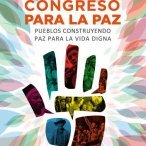English · Español

22 March 2013 | Interviews | National Peace Congress in Colombia | Resisting neoliberalism | Human rights | Social activists at risk
Inter-Ethnic Debates
Preparations for the Peace Congress in Colombia
The Black Communities Process (PCN) is a network of Afro-descendant organizations of Colombia created in the 90s to enable a national process to defend territorial, ethnic and cultural rights.
During over two decades, the PCH has extended its work throughout the Colombian territory and currently influences areas of Alto Cauca, Kongal, Kusuto, Magdalena Medio, Tumaco and Bogota, the capital of the country. During the Regional Peace Congress in the South West area of Colombia which took place from March 15-17 in Popayan (capital of Cauca department), this organization, through its delegates, participated in the inter-ethnic debates considering them as crucial for the building of a new project for the country.
Through our correspondent in Colombia, Danilo Urrea, Real World Radio interviewed Jose Santos, member of the PCN. The leader said that “black communities, especially to the north of Cauca, have proposed the establishment of spaces to solve these problems that have been generated by the government, that is clear”. “Together with the Association of Indigenous Cabildos of the North of Cauca (ACIN) we established an inter-ethnic table to discuss different approaches to the problems and ways of building this vision of country and our own option of future in a joint way”, he said.
The main conflicts or “interethinc differences”, as Santos calls them, have been historically generated by the Colombian administrations. Access to land is one of the most controversial issues, but not the only one which is worsened by the governmental action or lack of assistance by the State. “All issues have to do with the territory, this is where all differences emerge. For instance, the issue of education. If there is an indigenous community, a peasant community and a black community, it is important to decide what kind of education we need to establish in that area. If education brings problems, let’s sit down, discuss and agree on an intercultural education, for instance". “The other issue has to do with health, we need to identify the ways to solve these difficulties, but in practical terms”, said the Afro-descendant leader.
The Regional Congress of the South-West area of Colombia concluded that it is necessary to build a social movement for peace. This movement is characterized as a broad, inclusive space, where different sectors are gathered and where we think about the peace process beyond the dialogues between the Colombian government and the Revolutionary Armed Forces of Colombia (FARC). With reference to this, Santos said that "it is necessary to enable spaces to talk about peace, and if that is enough to build a movement we have to do it, we just don’t know how yet". -
The conclusions after the meeting of the organization of the South West area of Colombia over the three days of Congress in Popayan will be taken to Bogota, from April 19-22, where the building of a social movement for peace has been raised as one of the specific goals of the popular leaders.
* Danilo Urrea is member of CENST Agua Viva – Friends of the Earth Colombia
Photo: nomadesc.blogspot.com







